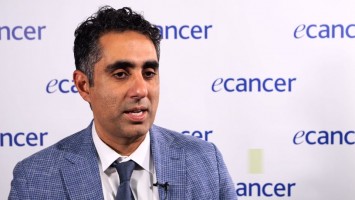ECC 2013
Percutaneous Hepatic Perfusion: localised chemo for liver cancer
Dr Alex Vahrmeijer - Leiden University Medical Centre, Netherlands
My PhD was about the open isolated hepatic perfusion system which was a very demanding surgical procedure that took us the whole day and, of course, was not repeatable so you only had one treatment, one-stop treatment. We did it for over twenty years and accrued more than 150 patients over twenty years which is not that much every year, of course. But when systemic immunotherapy became better then results from systemic immunotherapy and perfusion were equal and then you had a very huge surgical procedure versus systemic treatment so that’s the reason why we stopped, about four years ago, with the whole procedure.
What did you feel was most remarkable about the IHP procedure?
We could use doses of chemotherapy which were much higher when used systemically so we had about a twenty times higher dose of the chemotherapy, the drug, which could be handled by the liver without toxicity which was not possible to inject intravenously into a patient. So we had a shorter exposure, it was a higher dose of the drug and therefore we assumed that you had a very good response to the tumour to the only one hour treatment. The limitations were that it was a procedure which took about a whole day in surgery but, not only that, for patients who stayed about ten days, 10-14 days in hospital, so there was, of course, morbidity which would always happen. So the limitation was it was only a one-stop procedure so it was not repeatable so you had a result after a couple of months but then when you had a good response with the patient you could not apply the same technology again and even it was impossible to perform liver resections due to the fact that we had to mobilise the whole liver during the first procedure and then you were unable to come back into the same patient.
What parallels do you see between IHP and PHP?
The parallel is it’s the same drugs, so we used melphalan in the past and it’s the same drug now during the new procedure. With respect to dosages it’s also the same, so we injected about 200mg melphalan into the isolated circuit and with the new delta system it’s more or less the same. So based on dosing it’s the same dose and, of course, it’s a repeatable procedure. I heard people will leave the hospital within a few days and that’s a big difference with what we had in the past.
Why bring PHP to Leiden?
What we saw is we had a response rate in the patients after the one hour procedure of about 50%, so 50% of the patients respond to the treatment and then you want to add something else so you want to do the procedure again but that was impossible. So when there was a recurrence of something that you had systemic chemotherapy. But now you can do the delta procedure after the initial procedure so if there is a good response then you can continue after six weeks with a second procedure.
Which patients may benefit from PHP?
We are now planning patients with colorectal liver metastases, so the same indication we had before, because if you have only liver metastases then we hope that we can just increase the number of responses that we had in the past. So that’s what we want to do, so just do colorectal cancer patients with only liver disease and then perform a perfusion and if there’s a good response then another one. We are planning a study and it’s almost approved by our committees so it’s only a couple of weeks and then we are planning a study in about 36 patients where we aim to perform two perfusions before surgery if possible or at least two perfusions and then see what the result it.
What do you expect the outcome to be?
We hope that after the initial perfusion we have the same result as we had in the past so that we have, in patients who are not treated with chemotherapy before, we hope to have again a response rate of close to 50% and then add another perfusion and then you hope that the response rate will increase but that’s something we don’t know because it’s not been done before.
How can this treatment be made available to larger groups?
In the Netherlands we have the system that you have to prove in larger trials that it’s effective and then when that’s the case then reimbursement is the most important point because you can not do these kinds of procedures without reimbursement.
How do you see PHP fitting in with future treatments?
Wider treatment, the other indication we did in the past is melanoma and they’ve already proved that there is a benefit from the delta perfusion for melanoma patients but still we are waiting for the final results of the trial.








